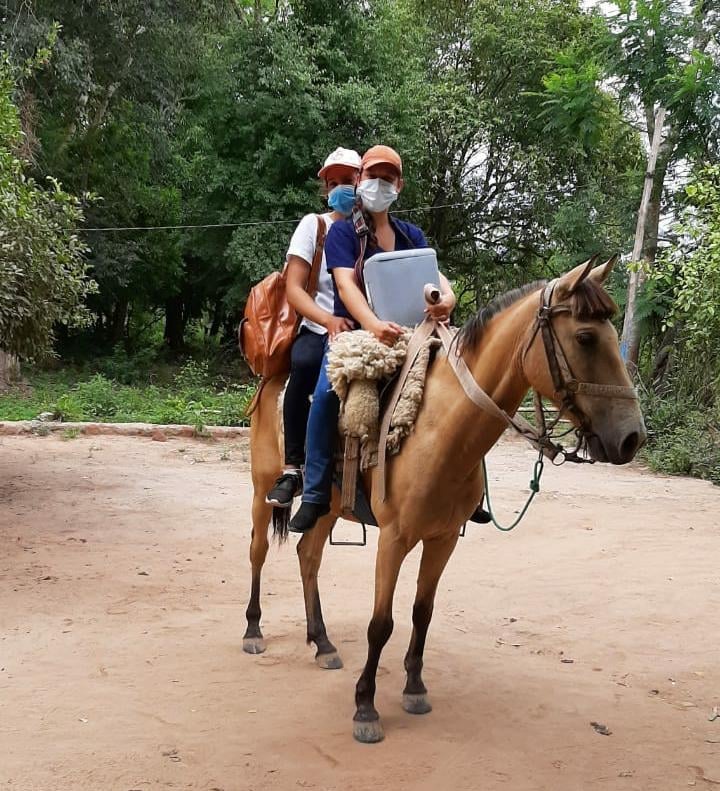Identifying opportunities to achieve the goals of the National Vaccination Campaign against polio, measles and rubella was the objective of the strategic meeting organized by the Expanded Program on Immunizations (PAI) of the Ministry of Public Health and Social Welfare (MSPyBS) with the technical cooperation of the Pan American Health Organization/World Health Organization (PAHO/WHO) in Paraguay, which summoned other State entities.
Assumption, March 4 (PAHO / WHO) During the opening ceremony of the meeting, the Vice Minister of Stewardship and Health Surveillance, Dr. Lida Sosa mentioned: “The purpose of this joint work is the protection of boys and girls who today need to continue with the vaccination process against diseases eradicated from the country such as measles, rubella and poliomyelitis, but that threaten public health due to cases reported in neighboring countries and other regions. As long as there is, anywhere in the world, a single child without vaccines, all of them are at risk”.
For his part, the PAHO/WHO Representative in Paraguay, Dr. Marcelo Korc, expressed his congratulations to the Ministry of Health and Social Welfare for holding the event, emphasizing the importance of intersectoral work not only to achieve the goals of the Campaign Vaccination, but also to ensure adequate vaccination coverage with all the biologicals of the regular schedule: “We are convinced that the participation of all levels of society and State institutions is required to maintain the achievements made in the country and the defense of immunizations as a public good and a right of the population, he pointed out.
In his speech, Dr. Korc also referred to the importance of implementing the Policy “Revitalize immunization as a public good for Universal Health, which was approved by the Member States during the 59th meeting of the PAHO Directing Council, to respond to the impact of the pandemic on vaccination coverage”.
This policy includes among its strategic lines: the strengthening of governance, leadership and financing of immunization programs; strengthening the integration of immunization programs in the primary health care system; the incorporation of strategic and innovative communication approaches to improve confidence in vaccines, among others.
The agenda of the meeting included the review of the global and regional situation of Measles, Rubella and Poliomyelitis and the risk for the reintroduction of these viruses in Paraguay; the behavior of vaccination coverage against these diseases and the progress achieved during the National Vaccination Campaign, as well as the identification of the main challenges to achieve the goal.
Regarding the situation of vaccination coverage, Dr. Héctor Castro, director of the Expanded Program of Immunizations of the country, stated: “The EPI has free, safe and effective vaccines available in the health services to protect the population. , but we face challenges in expanding vaccination coverage throughout the national territory, especially in distant and hard-to-reach communities. Achieving vaccination targets at the national level to prevent these and other diseases cannot be a task only for the Ministry of Health, we need local governments, other public institutions, local leaders”

Finally, in working groups, lines of action were identified that will be implemented in the coming weeks, such as the strengthening of the Campaign’s Management Structure, the reorientation of the Social Communication Strategy, with the participation of the different summoned instances; the articulation of the work with the Ministry of Development for the vaccination of the beneficiary children of the different social programs.
The meeting was attended by Dr. Víctor Hernán Martínez Acosta, Vice Minister of Comprehensive Health Care; Dr. Lida Sosa Deputy Minister of Health Surveillance and Stewardship; the Vice Minister of Information and Communication Technologies (MITIC), Hugo Alonso; the Vice Minister of Social Development, César Guerrero, as well as technical directors from different dependencies of the Ministry of Health and Social Welfare. For the PAHO/WHO Representation in Paraguay, Dr. Marcelo Korc, Representative, Dr. Fabiana Michel, Immunization Advisor, Alejandra Carillo, Health Systems and Services Advisor, and other technical consultants. Representatives of the Technical Committees for the eradication of Polio and the elimination of measles, rubella, and congenital rubella syndrome also participated.
Vaccines save lives
The impact of vaccines on reducing infant mortality is very significant. Between 2010 and 2018, it is estimated that the measles vaccine alone prevented 23 million deaths worldwide. Thanks to vaccines, it was possible to eliminate and eradicate many diseases that represented the main cause of mortality, illness and disability, such as measles and polio.
The Region of the Americas was the first to be declared free of these diseases thanks to vaccination and the implementation of a quality Epidemiological Surveillance System. To maintain these achievements, it is necessary to maintain surveillance quality standards and guarantee 95% vaccination coverage. In addition, ensure adequate preparation for rapid response to outbreaks.
In this context and seeking to reduce the gap in vaccination coverage achieved in the last 6 years, Paraguay is implementing the National Follow-up Vaccination Campaign (CNV) against Measles, Poliomyelitis and Rubella, which aims to vaccinate more than 800 thousand children from 1 to 6 years old with an additional dose of the MMR/SR vaccine, and more than 630 thousand children from 6 months to 4 years old with an additional dose of the oral polio vaccine. CNV represents an important opportunity to expand protection against these diseases for all children in this age range, including those who did not receive the vaccines in a timely manner, contributing to closing gaps in population immunity
Since its launch, on November 13, 2021, 34% of the target population has been vaccinated. To ensure the vaccination of 100% of children, in the second stage of the Campaign, the MSPyBS seeks to establish strategic alliances with other State institutions
–


